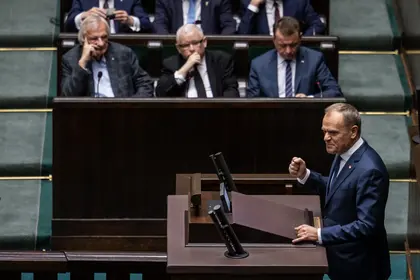Donald Tusk is making a triumphant return to the role of prime minister in Poland after the most recent parliamentary elections on Oct. 15.
On Wednesday, Dec.13, the president officially swore in Tusk as the new prime minister, ending eight years of right-wing populist rule.
JOIN US ON TELEGRAM
Follow our coverage of the war on the @Kyivpost_official.
The ministers of the new administration were also successively sworn in by the conservative head of state, who is allied with the previous government of the Law and Justice (PiS) party.
Although Tusk's party, the Civic Platform (PO), officially ranked second behind the Law and Justice (PiS), PO secured enough votes to form a coalition government with three other opposition parties, allowing Tusk’s nomination as prime minister.
His return is seen as crucial for restoring Poland’s standing in the EU and providing a significant voice amid the ongoing war in Ukraine.
As prime minister in Poland’s semi-presidential government, Tusk will lead the parliament and cabinet. President Andrzej Duda of the PiS, however, will remain as head of state, with veto power, until Poland’s next presidential election in 2025.
Tusk on Ukraine
Since 2014, Tusk has worked to rally the EU in support of Ukraine, advocating for expanded anti-Russian sanctions. He has consistently viewed Russia as a strategic problem rather than a partner.
In the recent election campaign, Tusk criticized the Polish government for a political conflict with Ukraine, especially regarding agricultural exports and manipulating the issue of Ukrainian refugees.

China, EU, Ukraine Leaders Take Davos Stage Under Trump Shadow
While presenting his political program to parliament ahead of a confidence vote on Tuesday, Dec. 12, Tusk said his proposed new government would call for the West’s “full mobilization” in support of Ukraine.
“We will call loud and clear for full mobilization on the part of the free world, the West, in support of Ukraine in this war. There is no alternative,” he said.
“I can no longer listen to politicians who say they are tired of the situation in Ukraine,” he added.
Apart from Ukraine, why is his return deemed so important?
The significance of Tusk’s return lies in ending the eight-year rule of Jaroslaw Kaczynski’s conservative Law and Justice party (PiS).
Over the past eight years under Kaczynski’s leadership, Poland implemented controversial policies, curtailed abortion rights significantly, and marginalized the LGBT+ community, migrants, and refugees.
Furthermore, European funding amounting to tens of billions of euros for Poland has been halted due to disagreements between Warsaw and Brussels.
The freeze is primarily a consequence of a controversial judicial reform, tying the justice system to the ruling power.
Having served as prime minister from 2007 to 2014 and as president of the European Council from 2014 to 2019, Tusk pledges to institute democratic reforms and unlock frozen EU aid.
However, challenges remain as PiS still commands significant support in Poland.
Local observers predict that Tusk’s primary challenge will be bridging the societal divide that has emerged in recent years, often called the “Polish-Polish war.”
Tusk-Kaczynski Enmity
Donald Tusk and Jaroslaw Kaczynski, the leader of the PiS are bitter enemies, with Kaczynski accusing Tusk of “moral responsibility” for the death of his twin brother Lech, who was president at the time, in a plane crash in Russia in 2010.
The crash occurred on the way to Smolensk, Russia, to commemorate the Katyn massacre of 1940, in which an estimated 22,000 Poles were murdered by Soviet security services after Moscow had invaded Poland and divided it according to a secret agreement with Hitler.
Initially, Polish and Russian investigators attributed the crash to pilot error, bad weather, and poor air-traffic control. In 2022, however, a PiS-organized panel examining the incident deemed it the result of an “act of unlawful interference by the Russian side” – thus reigniting the theory that Russian had conspired to assassinate the President and his most senior aids and military officers.
Conservatives have consistently accused Tusk’s government of negligence in preparing for the presidential visit to Katyn. More recently, amidst Russia’s invasion of Ukraine, Polish conservatives targeted Tusk for signing gas deals with Russia during his premiership.
To further complicate matters, the PiS party established a committee aimed at investigating citizens susceptible to Russian influence, a move seen by critics as a ploy to target Tusk.
Conservatives also alleged Tusk of being lenient towards Germany, with Kaczynski suggesting that Berlin sought to interfere in the election campaign and install Tusk as prime minister.
Tusk’s political comeback
The 66-year-old former prime minister plunged back into Polish politics as head of the centrist Civic Platform (PO) party after returning from a stint in Brussels.
President of the European Council from 2014 to 2019, he handled various crises, including migration waves, Greece’s economic plight, and tough Brexit negotiations.
Until last year, he led Europe’s top political group, the center-right European People’s Party.
From 2007 to 2014, Tusk had led Poland through the global financial crisis, achieving the remarkable feat of maintaining growth when other EU states faltered.
Married to historian Malgorzata Tusk, he has two adult children, including a daughter renowned as a fashion blogger.
You can also highlight the text and press Ctrl + Enter










